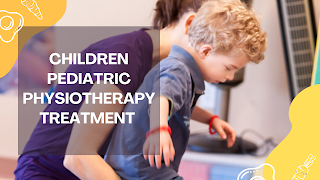Enhancing Development and Well-being in Children Pediatric Physiotherapy Treatment
Introduction:
Pediatric physiotherapy plays a vital role in promoting the physical, motor, and overall developmental well-being of children. This specialized branch of physiotherapy focuses on assessing and addressing the unique needs of infants, toddlers, children, and adolescents. In this blog post, we will explore the importance of pediatric physiotherapy treatment and how it can positively impact children's lives.
Understanding Pediatric Physiotherapy:
Pediatric physiotherapy is a specialized form of therapy that aims to improve motor skills, strength, coordination, balance, and overall physical function in children. It encompasses various treatment techniques and interventions tailored to the specific needs of each child. The primary goal is to optimize development, enhance independence, and improve the overall quality of life for children.
Common Conditions Treated:
Pediatric physiotherapy addresses a wide range of conditions and challenges in children, including:
Developmental delays: Delayed motor skills, such as crawling, walking, or sitting.
Neuromuscular disorders: Cerebral palsy, spina bifida, muscular dystrophy, and other conditions affecting muscle control and coordination.
Orthopedic conditions: Postural abnormalities, fractures, sports injuries, and musculoskeletal conditions.
Respiratory conditions: Asthma, cystic fibrosis, and other respiratory disorders affecting breathing and lung function.
Neurological conditions: Brain injuries, stroke, and genetic disorders affecting the nervous system.
Genetic conditions: Down syndrome, autism spectrum disorders, and other genetic disorders impacting physical development.
Benefits of Pediatric Physiotherapy Treatment:
Pediatric physiotherapy offers several benefits for children, including:
Improved motor skills and coordination: Therapy interventions help children develop and refine motor skills, such as sitting, crawling, walking, running, and fine motor abilities like grasping and hand-eye coordination.
Enhanced independence: Physiotherapy helps children gain functional independence by improving their ability to perform activities of daily living, such as dressing, feeding, and self-care.
Pain management: Techniques such as manual therapy, therapeutic exercises, and modalities can assist in managing pain and discomfort associated with various conditions.
Increased strength and endurance: Therapy programs include exercises and activities designed to enhance muscle strength, endurance, and cardiovascular fitness.
Improved balance and coordination: Children learn balance, coordination, and spatial awareness through therapeutic activities, facilitating safe and confident movement.
Early intervention and prevention: Pediatric physiotherapy emphasizes early identification and intervention, which can help prevent or minimize potential developmental delays or complications.
Treatment Approaches in Pediatric Physiotherapy:
Pediatric physiotherapy treatment plans are customized based on the individual needs of each child. The approaches may include:
Therapeutic exercises: Targeted exercises to improve strength, flexibility, coordination, and range of motion.
Balance and coordination training: Activities focused on improving balance, postural control, and coordination skills.
Manual therapy: Hands-on techniques, including soft tissue mobilization and joint mobilization, to promote healing, reduce pain, and improve mobility.
Assistive devices and equipment: Prescription and training for using mobility aids, orthotics, or adaptive equipment to enhance function and mobility.
Aquatic therapy: Water-based exercises and activities that provide a low-impact environment to improve strength, mobility, and coordination.
Education and home exercise programs: Educating parents and caregivers on exercises, activities, and strategies to promote development and continuation of therapy at home.
Importance of Family Involvement:
Family involvement is crucial in pediatric physiotherapy. Parents and caregivers play an active role in their child's therapy journey, including participating in therapy sessions, implementing home exercise programs, and providing a supportive environment. Collaboration between the physiotherapist, child, and family ensures a comprehensive and holistic approach to treatment.
Conclusion:
Pediatric physiotherapy treatment offers invaluable support for children with various physical and developmental challenges. Through tailored interventions, early intervention, and family involvement, pediatric physiotherapy empowers children to reach their full potential, enhancing their physical abilities, independence, and overall well-being. If your child is facing any developmental or physical challenges, consulting a pediatric physiotherapist can be a significant step toward their optimal growth and development.


.png)

Comments
Post a Comment